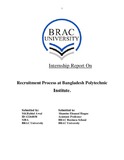| dc.description.abstract | Career and technical education is a term applied to schools, institutions, and educational programs that specialize in the skilled trades, applied sciences, modern technologies, and career preparation. It was formerly (and is still commonly) called vocational education; however, the term has fallen out of favor with most educators.
Career and technical programs frequently offer both academic and career-oriented courses, and many provide students with the opportunity to gain work experience through internships, job shadowing, on-the-job training, and industry-certification opportunities. Career and technical programs—depending on their size, configuration, location, and mission—provide a wide range of learning experiences spanning many different career tracks, fields, and industries, from skilled trades such as automotive technology, construction, plumbing, or electrical contracting to fields as diverse as agriculture, architecture, culinary arts, fashion design, film making, forestry, engineering, healthcare, personal training, robotics, or veterinary medicine.
Career and technical education may be offered in middle schools and high schools or through community colleges and other post secondary institutions and certification programs. At the secondary level, career and technical education is often provided by regional centers that serve students from multiple schools or districts. For example, the Boards of Cooperative Educational Services in New York administers a network of 37 regional career and technical education centers that serve students throughout the state. Many states have similar regional centers or statewide networks that operate as part of the public-school system.
In some cases, career and technical education is provided through a high school, where it may or may not be an integrated part of the school’s regular academic program. Students may also attend separate career and technical institutions for part of the school day, or a regional center may be the primary school of enrollment, where students take both academic and career and technical courses career-oriented program in which academic coursework is aligned with specific career paths, such as culinary arts, nursing, or engineering. There are 1200 students, 62 teachers and 20 staffs In Bangladesh Polytechnic Institute and two diploma technologies are taught here, one is Diploma in Engineering and another is Diploma in textile Engineering both engineering are 4-years(8-semester). | en_US |

